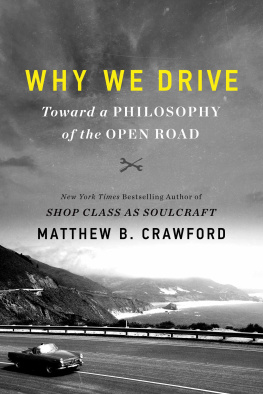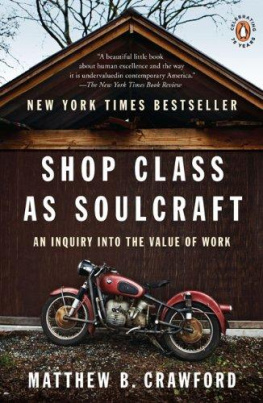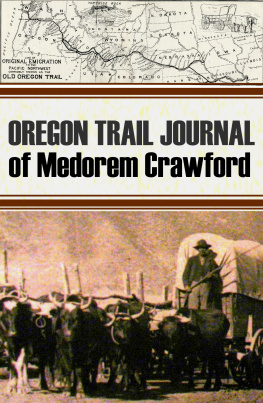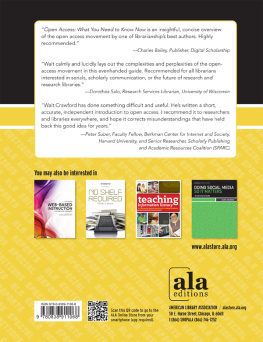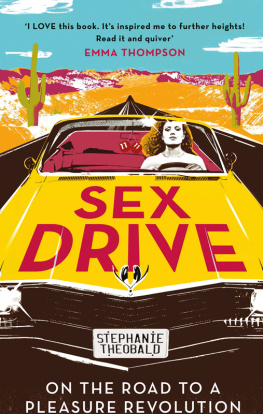Matthew B. Crawford - Why We Drive: Toward a Philosophy of the Open Road
Here you can read online Matthew B. Crawford - Why We Drive: Toward a Philosophy of the Open Road full text of the book (entire story) in english for free. Download pdf and epub, get meaning, cover and reviews about this ebook. year: 2020, publisher: HarperCollins, genre: Romance novel. Description of the work, (preface) as well as reviews are available. Best literature library LitArk.com created for fans of good reading and offers a wide selection of genres:
Romance novel
Science fiction
Adventure
Detective
Science
History
Home and family
Prose
Art
Politics
Computer
Non-fiction
Religion
Business
Children
Humor
Choose a favorite category and find really read worthwhile books. Enjoy immersion in the world of imagination, feel the emotions of the characters or learn something new for yourself, make an fascinating discovery.
- Book:Why We Drive: Toward a Philosophy of the Open Road
- Author:
- Publisher:HarperCollins
- Genre:
- Year:2020
- Rating:5 / 5
- Favourites:Add to favourites
- Your mark:
- 100
- 1
- 2
- 3
- 4
- 5
Why We Drive: Toward a Philosophy of the Open Road: summary, description and annotation
We offer to read an annotation, description, summary or preface (depends on what the author of the book "Why We Drive: Toward a Philosophy of the Open Road" wrote himself). If you haven't found the necessary information about the book — write in the comments, we will try to find it.
Why We Drive: Toward a Philosophy of the Open Road — read online for free the complete book (whole text) full work
Below is the text of the book, divided by pages. System saving the place of the last page read, allows you to conveniently read the book "Why We Drive: Toward a Philosophy of the Open Road" online for free, without having to search again every time where you left off. Put a bookmark, and you can go to the page where you finished reading at any time.
Font size:
Interval:
Bookmark:
After attending the Portland Adult Soap Box Derby,
I went for a hike in the foothills of Mount Hood. I stepped off
the trail for a bit, and a moment later heard voices approaching.
But they werent talking, and they werent really singing.
After a few more seconds of listening, I realized they were trying
to mimic the sound of a two-stroke motorcycle. Peering around the edge
of a boulder, I saw a man and a woman running down the trail
with their hands in front of them, as though grasping handlebars.
When their voices raised in pitch, they would twist their right wrists.
Hopping off little jumps, they would stick their butts out to the side,
as though kicking the rear wheel of a bike out to add a flourish,
motocross style. (This was a moment to rev the throttle too.)
Here was a middle-aged couple in their own secret world,
abandoning themselves to the motor equivalent of air-guitar.
Clearly, they were enjoying themselves more than anyone over
the age of twelve has a right to. This book is dedicated to them.
Contents
It is forty-eight degrees Fahrenheit and sweat is dripping down my back. My goggles are steamed up and it is hard to see. I am on a tract of land owned by the railroad, a wooded area in Richmond, Virginia, with discarded beer cans and the occasional homeless encampment commonly referred to as behind the Martins. Riding a dirt bike on a narrow, meandering trail that is rocky and muddy, with protruding roots and fallen limbs, creek crossings, steep descents, and tight switchbacks, at a mere fifteen miles per hour, I might be taxed to the very limit of my mental ability. Picking lines, making imperceptible decisions of throttle, clutch, steering, braking, and body English, revising them on the fly as surprises arrive at my front wheelall this demands total concentration. When I push the pace beyond my current level of confidence in response to some challenge of the terrain, it is a leap of faith.
Or perhaps it is a query. I cant say to what entity this question is addressedmyself? the obscurities of the trail? a loving providence? It is a position of utter exposure to contingency: lets see how things go. If it goes well over the following seconds (meaning without mishap, maybe even with a glimmer of some new finesse), this faith redeemed is the sweetest vindication I know of. For a moment, I feel existentially justified. In pursuit of that feeling, I once took four trips to the ER over the course of twelve months: two broken ribs, a broken heel, what I feared was a separated tendon (it was a muscle strain), and a case of heat exhaustion.
To ride a motorcycle off-road is in no way typical of the driving that we do most of the time, and therefore perhaps an odd choice of anecdote to open a book that ranges widely over the driving experience. But the heightened feeling of exposure one has on a dirt bike recalls one to a basic truth: we are fragile, embodied beings. There is a certain risk that is inherent in moving around, by whatever means. A responsible person does everything he can to minimize this risk. Yet is risk somehow bound up with humanizing possibilities?
In his exquisite essay about walking the hostile streets of Kingston, Jamaica, as a boy, and then New Orleans as a young man, Garnette Cadogan writes, When we first learn to walk, the world around us threatens to crash into us. Every step is risky. We train ourselves to walk without crashing by being attentive to our movements, and extra-attentive to the world around us. As adults, we sometimes walk simply because the street beckons with serendipity; you never know who or what you are going to find when you step out onto an urban sidewalk. Serendipity, a mentor once told me, is a secular way of speaking of grace; its unearned favor. Seen theologically, then, walking is an act of faith. Walking is, after all, interrupted falling.
The heightened contingency of driving off-road resembles walking in the faith it enactsthat of throwing oneself into the world with hope. The ancient Greeks had a single word to express the condition of being without a road, when the way forward is not clear: aporia. It represents a moment pregnant with the arrival of something unlooked for.
These experiences of serendipity and faith feel a bit scarce in contemporary culture, and the language for articulating them seems to be fading from common use. We have a vision of the future in which there would be little scope for such moments; the most authoritative voices in commerce and technology express a determination to eliminate contingency from life as much as possible, and replace it with machine-generated certainty. Thats what automation does, whatever else it may accomplish. Suddenly it is in the realm of mobility that this vision is being expressed. Suddenly driving is a topic that cries out for critical, humanistic inquiry.
On September 19, 2016, the National Economic Council and the U.S. Department of Transportation held a joint press conference. We envision in the future, you can take your hands off the wheel, and your commute becomes restful or productive instead of frustrating and exhausting, said Jeffrey Zients, director of the National Economic Council. President Barack Obama himself wrote an op-ed on behalf of driverless cars in the Pittsburgh Post-Gazette the same day. President Donald Trump affirmed these priorities early in his administration.
Driverless cars will finally solve the problem of moving people around with maximum efficiency, by ceding human control to impersonal algorithms. They promise to bring a messy, dangerous domain of life under control at last. Traffic jams will likely become a thing of the past, and accidents will be greatly reduced. So we are told, at any rate.
In this we can detect a familiar pattern. Driverless cars are one instance of a wider shift in our relationship to the physical world, in which the demands of competence give way to a promise of safety and convenience. The skilled practitioner becomes a passive beneficiary of something more systemic, rendering his skill obsolete. Human beings are terrible driversthat is the refrain.
Its hard to disagree. We are so distracted behind the wheel, we are already driving as if our cars were self-driving. But they are not, and the result can be deadly for anyone not encased in the ever-growing mass and air-bagged bloat of contemporary cars. Motorcycle deaths have shot up, and highway deaths overall rose at their fastest rate in fifty years from 2013 to 2015, despite a proliferation of new safety features. Nor, with GPS navigation, are you much required to notice your surroundings, and to actively convert what you see into an evolving mental picture of your route. Between the quiet smoothness, the passivity, and the sense of being cared for by some surrounding entity you cant quite identify, driving a modern car is a bit like returning to the womb.
The smartphone arrived in 2007. Now we had something to keep boredom at bay while getting around in the new manner, and it proved irresistible. This irresistibility became the basis of a new business model in Silicon Valley: harvesting and selling our attention. This is not hard to do when the road is a distant and dimly felt thing, as it is when one is serenely cocooned in four thousand pounds of plushness. The windshield begins to seem like one more screen, and it cannot compete with the dopamine candy offered on the other screens. So now Silicon Valley is going to solve the problem of distracted driving that it helped to create, by removing us from the drivers seat. Perhaps that is a good thing, on balance, given the realities.
Font size:
Interval:
Bookmark:
Similar books «Why We Drive: Toward a Philosophy of the Open Road»
Look at similar books to Why We Drive: Toward a Philosophy of the Open Road. We have selected literature similar in name and meaning in the hope of providing readers with more options to find new, interesting, not yet read works.
Discussion, reviews of the book Why We Drive: Toward a Philosophy of the Open Road and just readers' own opinions. Leave your comments, write what you think about the work, its meaning or the main characters. Specify what exactly you liked and what you didn't like, and why you think so.

